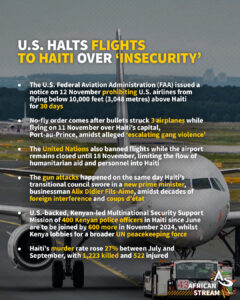On 12 November, the United States imposed a 30-day ban on US airlines flying below 10,000 feet (3,048 metres) above Haiti after bullets hit three US airlines on 11 November in the capital, Port-au-Prince, on the same day Haiti’s transitional council swore in a new prime minister, Alix Didier Fils-Aime.
All flights reached their destinations safely despite sustaining damage from bullets.
 The Caribbean country has endured a long history of foreign interventions since becoming the world’s first Black republic in 1804 by overthrowing French enslavers. Years of economic and political problems, often instigated by Washington, have destabilised the country. Over the years, scenes have shown thousands of people protesting in the streets over foreign interference. In October 2023, the UN Security Council agreed to authorise a Multinational Security Support Mission to Haiti led by Kenya and financed mainly with a promise of up to $300 million by the United States. An initial batch of 400 Kenyan police officers landed in Haiti in June, while 600 are due to join in November 2024.
The Caribbean country has endured a long history of foreign interventions since becoming the world’s first Black republic in 1804 by overthrowing French enslavers. Years of economic and political problems, often instigated by Washington, have destabilised the country. Over the years, scenes have shown thousands of people protesting in the streets over foreign interference. In October 2023, the UN Security Council agreed to authorise a Multinational Security Support Mission to Haiti led by Kenya and financed mainly with a promise of up to $300 million by the United States. An initial batch of 400 Kenyan police officers landed in Haiti in June, while 600 are due to join in November 2024.
As the aeroplane incident starkly illustrates, Haiti’s problems, which have deep historical roots, cannot be resolved by pouring more money and guns into the fire of colonial misdeeds. What is needed are comprehensive, long-term solutions democratically generated by the Haitian people.
Sources:
https://edition.cnn.com/2024/11/11/americas/haiti-spirit-airlines-jetblue-intl-latam/index.html
https://issafrica.org/iss-today/will-the-kenyan-led-police-mission-in-haiti-be-replaced
https://www.cnn.com/2024/03/11/americas/haiti-us-blinken-security-mission-intl-latam/index.html
